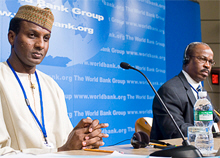
Typical street scene in Santa Ana, El Salvador. (Photo: iStock)
IMF Survey: Developing Countries Need Strategy to Face Global Crisis Impact
October 21, 2008
- Countries in Africa should be ready to respond to financial crisis fallout
- Advanced economies must not back off aid pledges due to financial crisis
- Finance ministers resolve to take own steps to improve their economies
Low-income countries should position themselves to respond to ripple effects from the global financial crisis, David Carew, Sierra Leone's Finance Minister, said during the IMF-World Bank Annual Meetings.

Ministers Zeine (l), Carew: To expand their HIPC network group to include all low-income countries with debt sustainability problems (IMF photo)
GLOBAL CRISIS AND LOW-INCOME COUNTRIES
Carew, noting the interventions by advanced economies to support their banking systems, said that it is clear that countries in Africa don't have the capacity to take such steps. He said low-income countries cannot yet deal with the impact of future credit problems in developing markets but stressed it is essential that developing countries "develop a strategy to take on the crisis when it happens."
Carew and Ali Lamine Zeine, Minister of Finance and Economy in Niger, said it was critical to the poorest countries that advanced economies do not back off aid commitments because of the global financial crisis. Carew and Zeine spoke at an October 12 press conference after release of a communiqué by the finance ministers of the 33 countries eligible for the IMF's Heavily Indebted Poor Countries (HIPC) initiative.
Separately, IMF Managing Director Dominique Strauss-Kahn also stressed that advanced economies must not cut aid budgets because of the financial crisis.
He emphasized October 9 the IMF's readiness to act quickly through its emergency financing procedures to lend to countries needing help during the present financial crisis. The IMF has more than $200 billion of loanable funds and can draw on additional resources through two standing borrowing arrangements.
Falling remittances
The ministers said the financial crisis, with the attendant slowdown of growth in advanced economies, will affect low-income countries in many ways—among them falling remittances, reduced capital flows, higher borrowing costs, and reduced demand for their exports.
The ministers pledged steps to improve their economies on their own, but also urged donors to fulfill their pledges of development financing and cited the need for more concessional loans . They said such steps are essential if the poorest countries are to make progress toward meeting the Millennium Development Goals. The ministers also urged the IMF and World Bank to produce comprehensive analysis of the impact of the crisis on low-income countries.
They noted that there has been little progress toward increasing the number of non-Paris Club governments in the debt reduction strategy of the HIPC initiative nor toward dealing with the actions of so-called vulture funds, which buy poor-country debt and then seek to enforce payment in the legal system.
Debt sustainability problems
The ministers also voted to change the name of their network to the Low-Income Countries' Debt Sustainability Network and to expand membership to include all low-income countries with debt sustainability problems whether or not they are eligible for the HIPC initiative.
The IMF said October 10 that growth in sub-Saharan Africa is projected to ease, reflecting increases in food and fuel prices, slower world growth, and global financial turmoil. A new regional forecast said recent heightened global financial turbulence raises the risk of a decline in resource flows to Africa in the form of private capital, remittances, and aid.
Comments on this article should be sent to imfsurvey@imf.org


